#I'm not sure if this is cohesive
Text
It’s fascinating to me how real-play shows easily slot into the metamodern movement so effortlessly, and without sacrificing the sincerity or quality of the story. By my understanding, metamodern stories are ones that are aware that they are stories, acknowledge the viewer and the absurdity of narrative itself (like Everything Everywhere All At Once, Into the Spiderverse, etc).
Personally, metamodernity meets the audience where we are now. When there is SO MUCH literature and film to build on, and nearly everyone knows the hero’s journey, it feels like something’s missing unless the story is exceptional, different, or more self-aware. Metamodern works can be great, but I think a lot of films that fit into the metamodern style lack heart. The style breeds a lot of “we’ll make fun of ourselves before you do, because we know you will. We’d rather disrespect our own story than let you feel smugly better than us if we’re sincere.” This is accelerated and compounded by the fact that many major releases these days capitalize on the nostalgia that drives sales for familiar IPs in reboot, rework, spin-off or the dreaded “cinematic universe” (the marvelization of it all).
But the difference with real-play shows is that the winking, fourth-wall breaking, the acknowledgement of tropes, the audience and absurdity of the universe lives on a separate layer of reality from the story being told. The characters aren’t joking about the worlds, their players are. The players (including the GM) are audience, writer and performer all at the same time. Instead of the edifice of narrative being an invisible force pointed out by its cracks, separate from the audience reaction, it is made explicit and woven into audience instead of narrative. Real play shows declare “these are people playing characters. Some plot and character choices are based on what was written beforehand, but most are made by dice and improvised in the moment. The reactions to those choices are made by both the player and the character. Of course these tropes exist, we’ve chosen a setting that supports them.”
Real-play shows are almost as if every film always had the director’s commentary on in the theatre, but the director's commentary shaped the plot, and made space for audience reaction to shape it too. We the audience understand that the commentary isn’t part of the story. What’s left untouched then, is the narrative itself. By acknowledging the edifice, the mechanisms of storytelling on the “commentary” layer, the in-story moments become totally sincere and embrace the story, unworried by the way in which it’s shaped.
#dimension 20#real play#critical role#the adventure zone#metamodernisim#I'm not sure if this is cohesive#I've just really been mulling it over lately
199 notes
·
View notes
Text
there's something to be said about people who say they care, who bray that they care, who claim that they care, but do nothing to show it beyond words.
words can carry so much power, but what kind of power they wield can fluctuate depending on your actions.
people will not stay if all you do is say that you care and do not show it. you have to show it. that's how bonds are made. it can be as simple as being in a voice call with no verbal exchange because you're still an active participant, it is a physical thing to just vibe with another person.
but you still have to be there for it instead of just saying you will.
#talk tag#i'm not sure if this is cohesive#personally speaking just being around people without saying much speaks volumes to me#it will absolutely vary from person to person but#sometimes i can't hold a conversation and just sitting is enough#it shouldn't end there i don't think#but it's nice when you hit that stage imo but also#you have to do more than just words#to keep lasting friendships
1 note
·
View note
Text
when ppl get too caught up in the accuracy of situations in fanfiction or if things are super realistic or as they should/would be in real life etc etc im like. my tumblr user in christ. it's fanfiction.
#ff writers don't get paid to put hollywood level research into their stories lol#also keep in mind ff writers don't have professional editors either#ALSO i've read a lot of published books and watched massive scale high budget production tv shows/movies that have put way less#effort into researching n making sure things are cohesive n legit compared to some fanfics i've read#js thinking ab a m00tie who had an anon come for her for something like this n i'm still pissed ab it#just enjoy the fic you're getting to read for free#like obv i think realism makes for a great story and is part of what good writing entails#but?? it's ok to bend the rules in some places?? it's a STORY#that's like getting pissed at a fantasy book for having dragons cuz they don't exist irl#just say u have a bad imagination n go#the author's pen is the will of the world in the story perioddd#either accept them or dont. but don't make fun of or criticize authors if you're not fuckin w it when ur just sittin behind a keyboard#also sometimes i just wanna read stories that don't remind me of the harsh truths of reality lmfao like get outtaaa heeerreee#just writer things
46 notes
·
View notes
Text
Still thinking about how understanding what happened in the S3-S4 relational narratives requires you suspend the belief that the last two (soon to be 3) seasons of Stranger Things are designed to stand alone.
With S1 and S2, the seasons existed as standalone entities—S2 was a sequel yes, but it wasn't a direct narrative extension of the action that occurred in the season before. You could watch Season 2 with only a bit of context from the first season (one boy got kidnapped and taken by the monster into another dimension, the girl from the lab with the superpowers showed up and they worked together to save said boy, but then she disappeared and was presumed dead) and watch the second season with little issue.
Its not the same with Seasons 3-5. If anything...it helps when analyzing to imagine Seasons 3-5 as one "season" in the same way S1 and S2 exist as single entities; the Duffers have already confirmed its true for Seasons 4-5, but it gets a lot easier to follow arcs and action, particularly for the youngest characters, if you stop trying to find coherence in single-season stories and look at each season as three parts of a whole.
This is true across the board, but it's particularly true in the case of understanding Byler, both as individuals and a pairing (though the full buildup of their romantic arc will take us across all 5 seasons). Understanding why S3 feels like you just got dropped into nonsense with them specifically (after two seasons of Michael "I'm the only one who cares about Will" Wheeler and Will "I am central to the story even when I'm off screen" Byers) is because The Duffers took the risk of introducing a brand new set of conflicts to the youngest characters: namely, ongoing romantic relationships, personal identity crises and sexuality...only without resolving the conflict and action in the 8-9 episodes they usually do, which is why you feel frustrated by it.
Basically: Season Three was the season where we set up the relational problems that need to be fixed—we just have three entire seasons to work through them, which means its gonna look bad at the start and good as we work through the problem (over the course of a few seasons) to get to the solution.
forewarning: ferociously long post ahead (with headers for clarity)
Will’s Arc: A (Queer) Coming of Age
With Will, the problem re-introduced in S3 is that he feels different from his peers, and not just because he's gay; its because 1) he is in love with Mike in a way that is more genuine than we are being presented in the third season (that "sandbox" "puppy love" "break up and makeup" summer fling energy that S3 has) and 2) he is unwilling to step into the lie of "maturity" as its being presented in the story, aka giving up things like hanging out with his friends over focusing on relationships or giving up games (DnD in particular).
(sidebar: I wrote another analysis touching on the above here).
A lot of people I've met who watch the show casually say things like "it just seems like he's not able to grow up like his friends" and even "he's falling behind," but I think that's on the right track while missing the point: the reason Will is written as "refusing to grow up" is because he is the character that represents the rebellion of The Duffer's heart and interests, and both of the things that seem like they would be a bad because they make his character different in the narrative are actually surprisingly positive for his "three season" arc...if you understand what the ongoing themes of Stranger Things are.
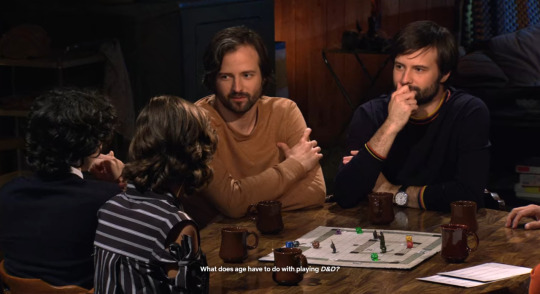
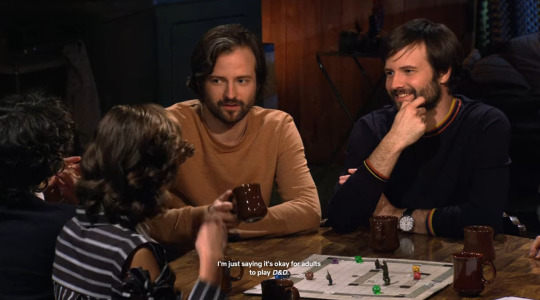

With Will, the “problem” in the story exists because he is the one who represents being weird/the outcast/queer and not giving into the social pressure to “let go” of that—he loves another boy, is more emotional than his peers and loves nerdy things like his tabletop board game and refuses to deny that to himself, no matter how brutalizing that is for him and his feelings. In that way, he is the character who “represents” the sentiment of The Duffers themselves—he is a nerd, a child at heart, and he has no problem taking DnD and anything else into “adulthood,” (looking at you “yeah, yeah I really did” during the rain fight) the same way The Duffers have.
That said: as we move into season 4, Will is presented with an evolution of this conflict—he wants to continue to be honest with and about himself, his feelings, and his interests…but it comes in direct conflict with his understanding of his peers & Mike, whom he loves.
We see this conflict show up repeatedly in Will’s actions in S4, especially in regards to the painting, which is the physical representation of both his love of Mike and his embracing of his nerdiness. Will shows up to the airport with his painting in spite of not speaking to Mike because his heart is to be honest and true-to-self regardless of anyone else—you even see this as he takes the painting on the road when they plan on going back to Hawkins, after he makes up with Mike. The problem is though (and this plays into the whole “we want you to feel like you lost” sentiment The Duffers spoke about, as S4 is the “down” before the “up”resolution of the whole narrative) that Will he realizes that his desire to be honest is getting in the way of (his perception of) the happiness of the people he loves, so he decides to betray his character and break the first cardinal rule of The Party…to tell his first lie.
There are plenty of phenomenal analyses on other aspects of Will’s connection to Vecna/the UD and the love triangle dynamic at play across this app so I’ll leave that alone here (I do have many thoughts on why the above makes Henry Creel the perfect villain foil to Will specifically), but: for the sake of understanding Will’s relational narrative arc, it’s critical to understand that our “low” for him is the betrayal of his ongoing S3 character—and that him undermining his self-honesty, nerdiness and love for Mike are the things that The Duffers have set themselves up to resolve in S5.
The resolution for Will is to re-embrace his differences —to realize that lying to yourself and other people about who you are and what you love (both in terms of “nerdy” interests and his queerness) is not who he wants to be, no matter how hard it is to stand up for in the wake of adversity—along with embracing the power of real love, which is also an ongoing theme the Duffers have set up in their relationships beginning in Season 3.
Now…on to Michael.
Mike’s Arc: Finding Yourself & Embracing What Makes You Different
—anyone with a single toe in this fandom knows that Mike Wheeler is one of the most divisive characters in this story when it comes to deciding 1) what his motivations are and 2) what his desires will be, but (and bare with me on this)…I think that’s kind of the point of his story. Mike’s “three season” arc is about him moving through a confusion of identity into someone who can embrace himself while addressing the things he is most insecure about—namely; being seen, being useful, and (very, very likely) the fact that the person who makes him feel most secure, seen, useful and loved is another boy.
There are several context clues that give credence to the fact that the reason Mike feels so wishy-washy / lacking in depth is because his struggle is not knowing how to find his place in the world, though you have to go further back than S3 to find them. Let me explain.
From the literal pitch of the show, there has always been an undercurrent of self-doubt and insecurity in Mike; his desire to escape the weight of feeling insecure has been a driving factor in his actions since before he was even on the screen, and it is impossible to understand what motivates him without first understanding that.

With Mike, his actions across all seasons have been weighed down by his desire to escape his insecurities through action—and as he’s gotten older, what he’s used to escape those insecurities (to be someone like the paladin he plays in DnD) has evolved and shifted, ranging through everything from turning the world (no pun intended) upside down to find Will; being willing to sacrifice his life to save Dustin from bullies; using any weapon he could find to fight a baby demogorgon; and wanting to be a heroic knight who protects the perceived vulnerable girl once he starts dating Eleven.
The point is: Mike’s deepest core need is to assuage his insecurities by doing whatever he can to be a good person—and when he feels like can’t do anything or protect the people he loves…he spirals. That’s been true since the start of his character…and everyone from The Duffers to Finn Wolfhard himself has mentioned it.
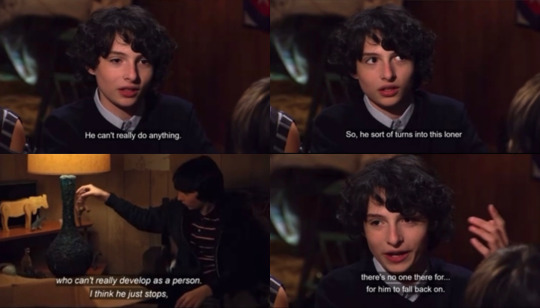
Now. With that baseline established, let’s talk Season 3.
Ironically enough, a lot of people feel like Mike’s character has “fallen off” because he, by the sake of all appearances, has achieved all the things he is supposed to want—namely a girlfriend, which (at least in his mind) is the physical embodiment of successfully “addressing” his core fears.
Because Mike has all the external markings of a well-adjusted kid—he comes from a wealthy family, has a solid group of friends (who are also mostly now striving for social normalcy) and even a girlfriend—he seems to have addressed what many people even in real life believe is the end of most arcs & the fulfillment of the fantasy. For Mike, the appearance of his S3 life seems to have assuaged the fears at the root of several of his insecurities, including the desire to be needed, the desire to protect, the desire to be useful, and the desire for acceptance…all because now he’s saved El and has her at his side, and having a girlfriend means he has everything a good, well-adjusted guy is supposed to want.
Or…does it?
With how The Duffers set up the story (with S3 as the introduction of a new conflict for every major character), the answer they’re giving you based on how Mike interacts with other characters is no—having a girlfriend and acting “mature” doesn’t solve anything, especially if the core problem of you having an insecure identity while being dishonest with yourself isn’t addressed…and it’s the arc of Mike learning that “lesson” that we find ourselves dropped into moving into Season 3.
Beginning in S3, the war on Mike’s insecure self-concept comes at him on two fronts: on the one side, El, who started her journey needing Mike because of her background but now has no real need for any of the things he so desperately wants to provide as a means to validate himself, and on the other Will, whose deep familiarity and history with Mike combined with his confidence in his own identity presents Mike with a challenge of self-reflection that he doesn’t exactly feel ready for yet.
(sidebar: my post on how Mike's arc is intrinsically tied to a subversion of the "Born Sexy Yesterday" trope is a helpful expansion on things I talk about here).
We see this in how Mike gets frustrated with Max for giving El the space and language to not need him (undermining his role in her life as someone who she needs to protect/guide her); we see it in how he says cruel things when Will behaves in a way that challenges the actions Mike has taken to be “mature” (how he insults Will for not also wanting a girlfriend / still wanting to play the games that set them apart as nerds/different); and we see it in how Mike still goes out of his way to fix those relationships in the best way he can—because he knows on some level that what he’s doing in several moments isn’t in alignment with who he wants to be, even though they are both presenting him with radical internal challenges.
Ironically enough, Dustin does a great job of summarizing the two sides of Mike's internal conundrum in what he says to Steve about Robin—Mike, somewhat like Steve, is struggling between what is socially acceptable in a partner (or "cool") and what he actually wants and enjoys in one—and as El and Will evolve, so does Mike's internal conflict about how he perceives their places in his world.
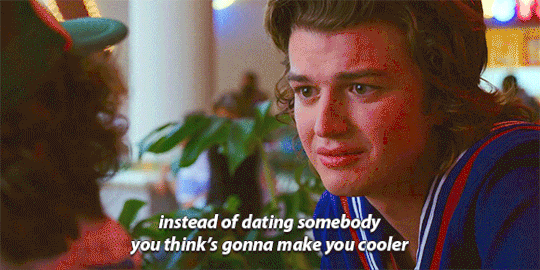
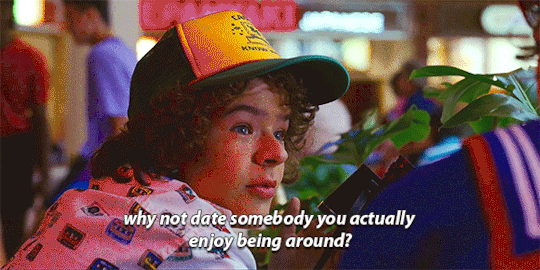
Between El’s supernatural abilities and rapidly growing autonomy making him obsolete to her in all the areas that matter to Mike (see: the ability to protect, be useful, and be seen) and Will’s reminding him that at his core he is just as much of a nerd as Will is, Mike finds himself feeling more confused and insecure than ever…and that is the internal conflict we see him end S3 battling.
The evolution of Mike’s narrative arc past the introduction of this internal conflict doesn’t happen until is the Byers/Hopper move to Lenora though…when he is literally left alone to process what that intense summer brought to light for him—which is the note we're left on as we move into the next phase of Mike's evolution in S4.
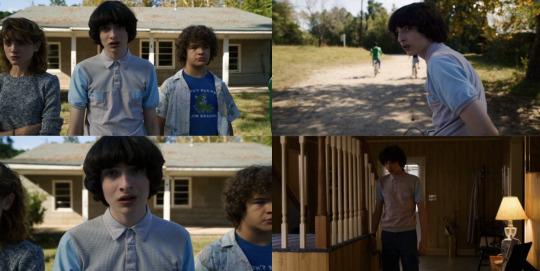
In S4, the development of Mike figuring out what he wants and needs from his relationships + the kind of person he wants to be becomes a lot more external—we see him going through a series of code switches as he tries to manage the ever changing landscape of his self-perception, where has started journey toward self-acceptance but is still insecure about following through with it.
We see this in the way he has now joined The Hellfire Club and shows sincere signs of accepting his interests and "outcast" status, but still looks forlorn when Lucas says “I’m tired of being bullied / I thought you wanted things to be different too” (Lucas’ struggles with some aspects of performing normalcy the way Mike does S4).
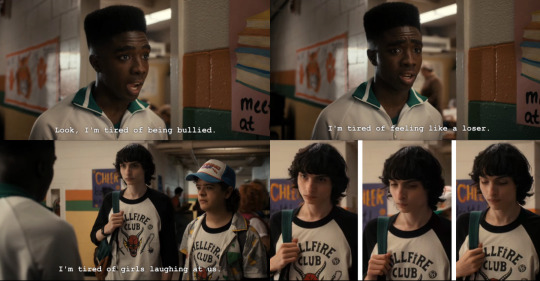
We see it in the way he shows up to Lenora dressed in what he thinks he’s should be wearing rather than as himself / the way he continues performing his relationship with El throughout that first day (and how he says it was Will who "sabotaged" things by being that same kind of radical honest about his feelings we talked about before)...only for the events of the day to spur him into meaningful honesty with both El and Will (to varying degrees of success) mere hours later.
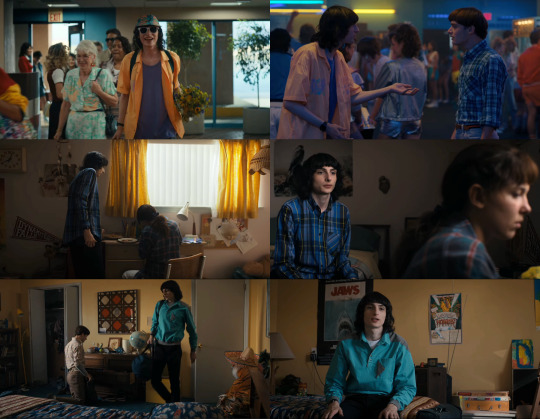
We even see it in the way Mike seemed to have been “turning over a new leaf” once he and El fought, to the point he was okay with them ending the “normalcy” performance of their romance…right up until Argyle’s paranoia while burying Unknown Hero Agent Man struck the fear of god back into him (aka making him worry he was letting El down by not protecting her—aka tapping into one of his core fears).
Basically: Mike is leaning into accepting the things that make him different in little ways, but is still struggling to step into that identity fully—aka he is still using perceived social acceptability as a shield, even though he no longer holds as tightly to being perceived as normal. (Even Finn himself often jokes about Mike “just trying to be normal,” which I think is a good, simple explanation of what’s happening—that said, if we take that reading and combine it with those “narrative goals” I mentioned The Duffers have earlier…Mike trying to be normal is an issue to be resolved, not an identity to be embraced. But…let’s move on).
By the time we get to the infamous van scene, we’ve watched Mike struggle through the two sides of his inner conflict for the entire season now, and felt him very gently succeed at switching into a more honest version of himself (who doesn’t need a girlfriend as a shield / can embrace his “otherness” in the same way Will does) right up until his inherent desires to be needed and useful come rearing up the second El is in danger.
It’s why we see him look pleased (but also marred with conflict) when Will looks confident, happy and radiant talking about “playing dnd and Nintendo for the rest of their lives…” and why him being honest in that scene is actually a huge moment for him, because rather than being vague about what has been plaguing him for two seasons now (trying to be “normal” just because he feels insecure) Mike is finally verbalizing the internal conundrum of his now two seasons of looking critically at his insecurities.
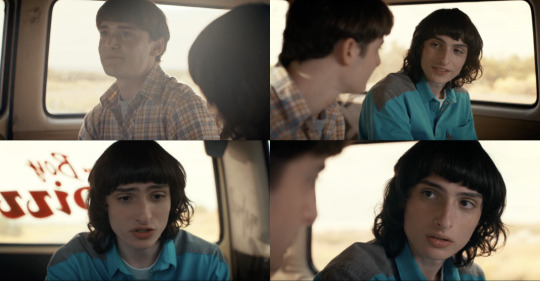
Now—I could spend all day digging into just that bit of narrative alone—the way Mike finally externalizing his insecurities to be processed with Will rather than acting on them and hurting people unintentionally is a giant leap for him, and how when Will says “you’re sacred of losing her” Mike’s nod is an acknowledgement that Will is right…but his face is saying there’s more to that fear than he’s acknowledging—
—but for the sake of this analysis of the narrative arcs, the van scene is most important because it’s when the S4 “it feels like you lost” moment begins for Mike…and that’s because it matches up directly with the “you feel like you lost” moment for Will: him lying about the painting.

When Will lies about the painting—saying that his feelings and the art that (as I said before) represents 1) his love of Mike, 2) his embracing of his nerdiness and 3) that radial self-honestly Mike so admires Will for—it throws a wrench into Mike’s internal revelations because Will is essentially saying that the relationship that Mike was slowly realizing he used to assuage his insecurities (his relationship with Eleven) is actually what lines up best with "who he wants to be," which throws Mike’s slow growth toward Will + honesty about what (and who) he wants to be into a tail spin.
From Will’s lie onward, Mike is thrown into moment after moment of conflicting emotions and dire circumstances as well—and given that Mike's deep terror of losing people comes up strongest when the people he loves are in danger, it’s only downhill for Mike’s growth toward self actualization from here. In that sense, (much Jonathan's S4 omissions of his truths/fears to Nancy leading to Nancy's regression into complacency / social conformity with Steve), its Will's lie that leads us directly into the “you feel like you lost” moment for Mike: him moving back into "conforming" territory and confessing his love to El in the SBP.
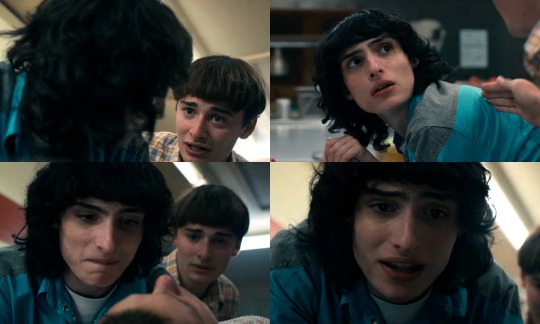
The monologue (at least in terms of the narrative arc The Duffers are writing) is Mike’s “losing” moment because it’s when he has enough self-revelation to realize that being with a girl as a shield for his insecurities is no longer what he wants...but the drive he has to be useful, protect and love any way he can (on top of Will’s urging + lie) leave him feeling like his only option is stepping into the person he was at the start of S3.
In this moment, we see Mike say exactly what someone who is "acting normal” about loving his girlfriend and wanting to save her would….even though romantic love with El (and the socially-acceptable romantic relationship he has with her) are not what he really wants, and what we will watch crumble moving into S5.
Essentially: Mike having a moment of dissonance of that magnitude after an entire season of looking toward Will was what set us up to see all those "external markings of normalcy" Mike has held onto and had started grating against for two seasons now fall apart, given what we know about those core messages/themes/child-at-heart values the Duffers hold and keep at the heart of their show.
As of the end of S4, we can already see how this "regression" into his old self is not going to hold—the fact that everything Mike did to save El is rooted 1) in a lie and 2) not in alignment with Mike evolving understanding of his core desires makes sure of that.
We even see the beginnings of this "low" being resolved in Mike's arc in how Mike & El are not speaking (even with the 'resolution' of their surface-level S4 conflict with Mike's love confession) and how Mike is glued to Will's side even before Vecna is mentioned–which is how we've been set up to see the resolution of Mike's arc in S5.
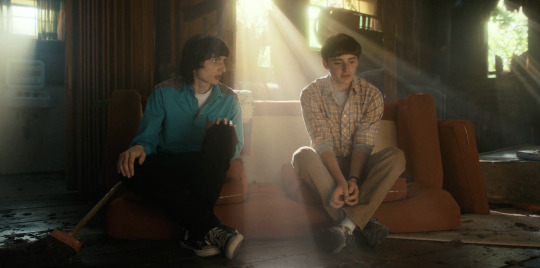
With all this in mind, it becomes a bit clearer that the resolution of Mike's arc is him moving through the confusion of identity we've watched him go through from S3 forward and into someone who can embrace who he is what he truly loves without fear of going against what is expected—aka finding the courage not to conform.
Mike as a character is a lesson in how doing what you think you're supposed to (aka what is "normal") is often at odds with who you are and what makes you the happiest—and the only way to self-actualize is to move past your insecurities and into someone who can be confident embracing what (and who) they really want...even when it means stepping out of line from what you’ve grown up believing would do the self-actualizing for you.
Final Thoughts
Both Mike and Will's relational arcs revolve around an embracing of what makes them different—in terms of their (highly likely) mutual queerness, yes, but also in terms of them making self-actualized peace with being nerdy "children at heart" in much the same way The Duffer Brothers themselves are.
If Will represents a person who struggles because they refuse to deny themselves their identity, Mike represents a person who struggles because they don’t understand their identity, and are walking around just trying to do whatever they can to get along (because they haven’t been presented with the inciting conflict that will move them into self-revelation & growth).
Both of these internal conflicts are narrative arcs that have been built into the coming of age stories of both halves of Byler—and though we are currently sitting at the "low" of both of their arcs as of the end of Season 4, the setup and though-line for them finding themselves (and real, honest love with each other) has been clearly set up for exploration in Season 5.
—if you managed to get through all of this, I commend you. And yes, there are a million other things to be explored between these two, but...I enjoy sorting through the thematic / "moral of the story" through-lines in all my media, so of course I was gonna do it for for Byler!
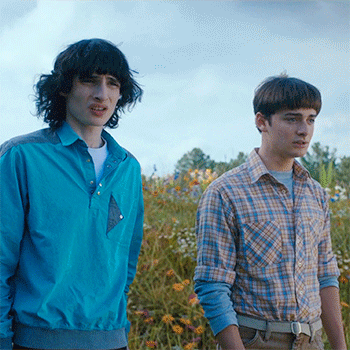
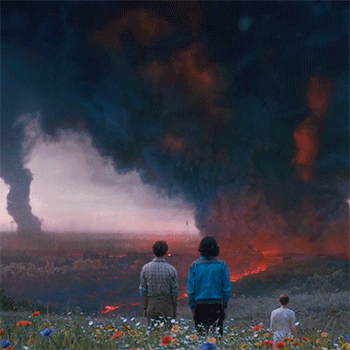
#byler#mike wheeler#will byers#THIS IS THE LONGEST THING EVER AND I'M STILL NOT 100% SURE ITS COHERENT BUT I'M TIRED OF SITTING ON IT LMAO#I will also probably be editing bits and pieces of it over the course of the next day for coherence so apologies if you find an error lol#but !!! this is the most cohesive way I could think to explain how their arcs work separately and individually#esp with the ' big messages' of the Duffers discussed /included#ANYWAY. HAPPY FRIDAY LOL#mike wheeler core#will byers core#my st commentary#stranger things#the me tag#the come back tag#duffer brothers
324 notes
·
View notes
Text
Daughter of the Rain and Snow
Concept: Around ten years after the events of Crooked Kingdom, 25-year-old Captain Inej Ghafa frees Maya Olsen from a pleasure house in Ketterdam. Maya is looking for revenge against the man who put her in her position, a man who she knows nothing about except his name: Kaz Brekker.
Tags: @wraith--2 @lunarthecorvus @just2bubbly @real-fragments7 @ethereal-maia @cartoon-clifford @origami-butterfly @lady-a-stuff
Content Warnings: in more general terms I want to remind people to be aware of the nature of Kaz and Inej's experiences and relationship since even if I'm not directly addressing these things they tend to be implicit in any writing about them, but specifically to this chapter there's death, gore (including burning bodies), descriptions of dead bodies, blood, ptsd references/responses, loss of a parent, implied abuse, and sorry I don't know how to word this but if you don't like/are specifically squeamish about eyes there is a reference in the gore that is specific to eyes so I thought it might be worth mentioning.
Chapter 21 - Maya
Maya was twelve when she first discovered she was Grisha. Little things started… happening. Things she didn’t mean. Or at least, they started happening much more frequently than usual. It wasn’t until then that Stephen Olsen had taken his daughter by the hand, and told her the truth.
Maya hadn’t cried, when she learned her mother had been Grisha. Had been killed for it. She didn’t know how to mourn a woman she’d never met. But she cried when she learnt that they had burned her.
“You told me she was with Djel,” she’d said, “That she died in childbirth and you buried her, to take root,”
Her father had looked down.
“Because I cannot think of the alternative,”
“Is that what will happen to me?”
He had wrapped his arms around her.
“Never,” he’d whispered, “I would fight a thousand armies before they reached you, little wolf,”
Her father hadn’t known that she was Grisha, he told her, or he would have got her out sooner. It didn’t occur to Maya, at 12 and in what was soon to become a perpetual state of fright and shock, to ask why her mother hadn’t been able to get out. To ask the entire circumstances of her loss. The next thing she knew they were making plans. They moved to Ketterdam, and the world ended before her eyes.
That fucking ledger had set the wreckage on fire.
Maya tried to imagine the feeling of her father’s arms around her shoulders. She was his little wolf, and Djel had given her a gift to make him proud. But it was an untouchable memory, sinking beneath the waves just out of reach, tangled and bleeding and mixed up with the messy scrawl that set the last thing she clung to ablaze.
Maya had left Inej telling herself that the ledger was a lie, but if that was true then why was she still thinking about it? Like the words were scarring her. Like they were smoke and she was choking on them.
The world was buzzing from a great distance.
Maya didn’t know what she was doing.
She could feel the shadows of Aimee and Kiada’s hands throbbing across her own. It wasn’t quite pain, but it was excruciating. She heard everything muffled through a barrier of rushing blood, her head spinning and her stomach threatening to empty its contents into the canal. Real pain split her shoulder, pain worth feeling, piercing through the din of everything else. The kind of pain that meant you were alive. Her vision blurred, just for a moment.
Maya was realising what she’d done.
Kiada was on her knees, holding herself up with shaking arms. She looked at Maya like a rabbit staring down the barrel of a gun. There was a graze on her cheek. Maya felt herself choke, stumbling backwards and shaking her head.
“I don’t-”
The girls looked at her in silence.
Djel, what had she done? She was meant to protect them. She was meant to be brave for them. She wanted to be brave for them.
“No, I didn’t - I -”
She stumbled a little as she stepped backwards, and she saw Aimee inch towards her before freezing in place.
“I’m sorry,” she whispered, the words scratching her throat, “Oh, Djel, Kiada I’m so sorry. I didn’t…”
She couldn’t breathe.
“I…”
She was choking on the smoke. She was burning.
What had she done?
“Maya?” said Aimee, looking between her and Kiada
Maya realised dimly that Aimee didn’t know what to do. She didn’t know if she was safe to help Kiada.
Maya had done that too.
She’d made her afraid.
“I’m sorry,” she whispered, “I’m sorry,”
Aimee helped Kiada to her feet.
“Do you want to go?” she asked, staring at them, “You can. I’m sorry, I shouldn’t - I’m so sorry,”
“We need help, Maya,” said Aimee, moments before Maya thought the silence would become too much, “We have to go back. She said if you went back she’d help you,”
She shook her head.
“I can’t,”
“Inej did nothing to you,”
Maya’s shoulder screamed its disagreement, but she knew that wasn’t what Aimee meant. Still, she didn’t know that she believed it. If she was supposed to believe that her father had… no. One page of a gambling parlour record wasn’t going to cut it. She needed proof. There had to be someone she could make pay. She needed it, before it ate her alive.
And even if Kaz Brekker wasn’t to blame for this sickness inside Maya, his death would pay for Celina’s. Wonderful, wonderful Celina, dreaming of going home. Dreaming of the ice and the semla from the bakeries and her mother doing her hair for a village dance. Maya had seen the Reaper’s Barge only a few times; even from the shore the flames were high and bright enough to be visible. She imagined Celina, 6 slashes on her throat, a tulip on her cheek, lying at a broken angle with pale, twisted limbs tangled amongst a thousand others. She imagined the flames swallowing her, her glassy eyes still staring to the very last moment. Still full of their fear. Their guilt. Their blame. What happened to eyes, when they burned? Maya didn’t know. In her head they remained the longest, watching everything else burn away, and then they melted. Slow and grotesque.
She hoped that was what would happen to Yennefer. Maybe it already had. Maya thought of Yen's blood on her hands, congealing slowly beneath her fingernails. She'd wanted to be sickened by it, but she hadn't. She'd felt empowered - she'd felt high. She wanted to feel like that again.
Yen was to blame for Celina's death, and she'd got what she deserved. But Kaz Brekker was responsible for it as well. He would pay the price.
Kiada stood in dazed silence, half leaning on tiny little Aimee for support.
“You shouldn’t trust her,” she told them, “She lied to us,”
Aimee’s little face was hard. Her arm hooked around Kiada’s waist to hold her up, and she reached to brush gravel off the graze blooming on the older girl's cheek. Even looking at it happen, Maya felt tension in her back and rushing all the way down her spine. She squared her shoulders. Holding Aimee through the makeshift blanket had been her limit - and she hadn’t managed that for long. The girl lifted her chin, a kind of shadow in her eyes that should not have belonged to a child so young.
“She didn’t hurt us,”
That was all Aimee said before she turned away.
#side note: it’s really intrigued me that everyone immediately became suspicious of Esme in the last chapter#i was surprised by that#Anyway#it took a while to flesh this chapter out because I'm finding Maya a difficult perspective right now#her thoughts are kinda too scattered to be able to turn them into anything cohesive#I'm not sure if that makes sense lol#Maya Olsen oc#no beta we die like men#no beta read#grishaverse#six of crows#crooked kingdom#leigh bardugo#inej ghafa#kaz brekker#nina zenik#jesper fahey#wylan van eck#matthias helvar#kanej#kanej fic#six of crows fic#soc fic#fan fic#fan fic writing#my fic#kanej fanfiction#kaz x inej#kanej supremacy
18 notes
·
View notes
Text
I want! I want to be able to tell people i make art wnd write comics and have something to Point Too y'know?
Like sure i have art but it's not like... Art (not in a self-degrading way, just in a way that says a majority of what i've made is very casual and disparit, and lacks a cohesion of intent I see from many of the artists I admire)
And there's an embarrassment that comes with telling people 'oh yeah i'm an illustrator and I'm writing comics when i'm not at work' and then being able to show... Nothing of serious import.
(again not to degrade my work, I like what i draw otherwise i wouldn't habe drawn it. It's just most of it does not necessarily satisfy the set up of "I Illustrate and Write Comics")
#monster noises#now you may ask yourself;#Bartholomew.#what the friggity Fuck does 'cohesion of intent' mean#great question!#not sure i can answer it in words!#but the idea i think i'm trying to convey is... not consistancy of Style per-say#(I think i've got that okay)#but... having a gallery that looks Properly like a Body of Work#and not an assortment of odd sketches that are definitely all drawn by the same person but carry no memorable weight as a unit#i think that explanation makes about as much sense as the initial phrase#but sometimes translating a feel that exsists as a picture in your head into coherent speak is Hard
7 notes
·
View notes
Text
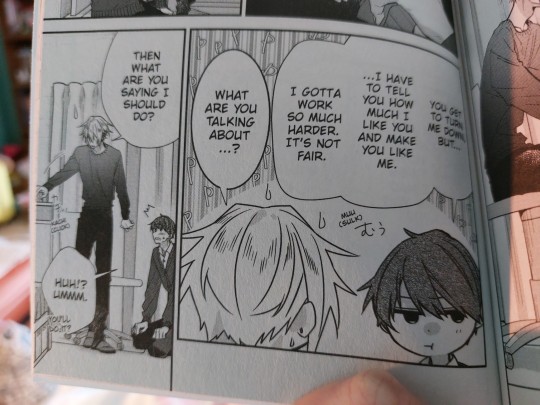
See, that's where he's wrong. I think it's actually.... just as difficult to be the one who's being pulled as it is to be the one trying to pull. It's actually really, really tough to be the object of your friend's affection. It's hard enough being pursued by someone you don't care about, but to be wanted by someone you do care about? To be put in a position where you either have to force yourself to have feelings you don't or hurt someone you care about? To feel like you have no choice but to either betray your own feelings or your friend's? It sucks. It sucks and it can ruin friendships. I would actually prefer to be the person trying to convince someone to fall for me than the person who someone else is trying to convince to fall for them tbh
#I've always been a bit overprotective of Hirano#bc i know all too well how much it sucks to be in this position#I've spoken about this before and i will again but honestly I'm not sure how i want kghr to resolve!!#im not sure i do actually want them to end up in a classic romantic relationship#[hides behind brick wall]#i know in my head his feelings are going to change#but im protective of the feelings he has now that know he doesn't want to be with kagi yet#i don't want those feelings to just be ignored#but luckily harusono-sensei writes in such a way that takes into consideration the characters feelings#(does that sound arrogant to say? lol)#so i trust that however the story goes its going to feel good#one of these days I'll write this post out in a more cohesive way bc I've been thinking about this for like a year and a half now lmao#kagihira#kagihira liveblogging
26 notes
·
View notes
Text
TONIGHT. I WRITE MORE.
#hold me to it#i have to finish this chapter.#it's such a mess rn#by mess i just mean that i've jumped all over the place and need to A) fill in parts and B) make sure what i've got is cohesive#i feel....mixed about it so far#idk what i don't like. but i'm not sure a another draft would improve it either#it's possible that it's fine and i'm just touchy because it's the Last One and my standards are so sky high
11 notes
·
View notes
Text
one thing i like about manga diavolo is how his hair and eyes change constantly from one page to the next
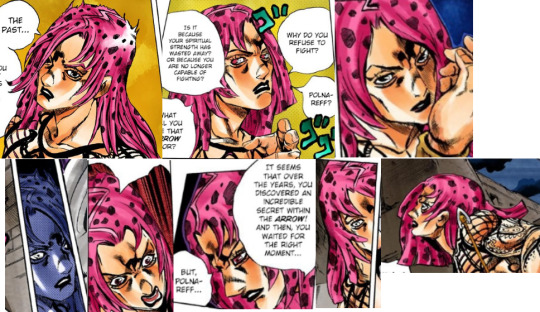
#maybe that's why baby doppio's eyes flashed red for no reason in the anime. diavolo can just do that when he wants#rambles#diavolo jjba#short posts#this is an element i think adaptations of diavolo lack really#obviously he can't be distractingly changing appearances every two seconds in the anime he has to be on-model#and im not sure if it was intentional because the manga is a little bit Like This in general#but diavolo's design inconsistency fits with his character i think#like... at this point in the manga the only person who's *seen* his face for years is polnareff who has been pushed out of society#diavolo has erased his identity from the world so thoroughly and up until now his depictions have just been vague shadowy silhouettes#and when we do finally see him his appearance shifts and changes and his eyes and hair and face are constantly inconsistent#almost like he doesn't really *have* a cohesive identity anymore as he has almost completely erased himself from the world#that would also probably pair with his DID/literally fractured identity with doppio and all#but maybe i'm reading too into it sdjfkslfj sorry
28 notes
·
View notes
Text
Me months ago: Teehee can't wait for STAE #6 when Hawk gets that letter postwar
Me today: Hmm
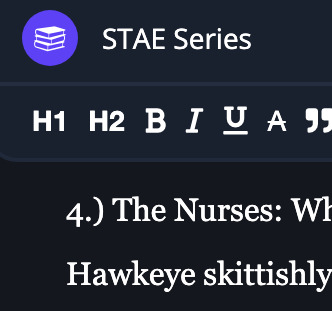
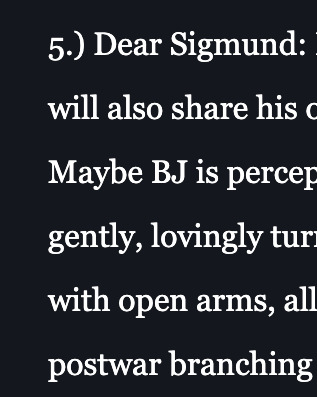
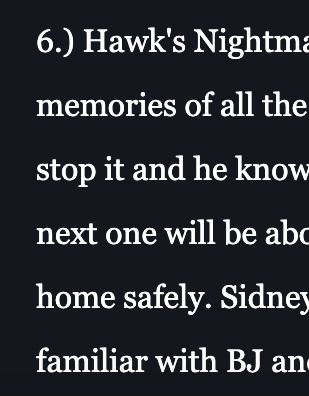
I seem to have misinterpreted series length. Raise your hand if you are surprised.
#i THINK the next four fics may be combined into one big fic#like maybe they're all novella-length and get put into four massive fucking chapters to keep it cohesive#but i'm not sure#maybe the whole next fic will be these same 5k chapters in length even if it's 80k long#or maybe they will be four separate novella-length fics#either way i'm in hell thank you for asking#my ramblings#my writing commentary#some things are evergreen
7 notes
·
View notes
Text
i don't know if i've ever said this but my personal way of reconciling the fact that walter and molokov's names are inexplicably different in bway is that their bway names are just their aliases. due to the undercover agent situation
#i'm sure this will appear in something i write at some point but i don't have anything cohesive rn#.txt
8 notes
·
View notes
Text

February-March 1979. In the second part of an unsettling two-part Batman story by Jim Starlin, with finishes by P. Craig Russell, a bizarre murder investigation segues into outright horror:
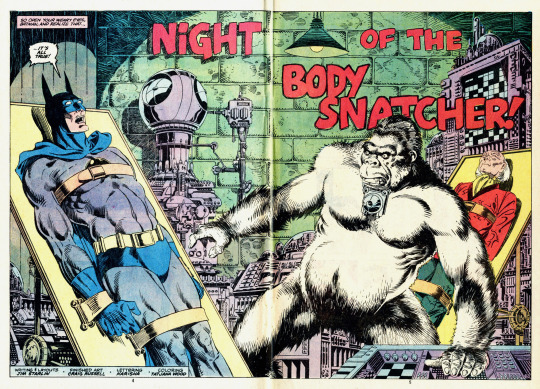
If you're familiar with Earth-2 villains, you might wonder if this is the Ultra-Humanite, a Golden Age Superman bad guy with a penchant for brain swaps. It's not, and in fact the Humanite didn't adopt his mutated white ape body until JUSTICE LEAGUE OF AMERICA #195, published a year and a half after this story. The mind in the white ape belongs to Xavier Simon, an old enemy of Thomas Wayne's, who is using the ape as an intermediary step in a complex and sinister plot. Having brutally murdered his three other surviving enemies, Simon now means to take Bruce Wayne's body, his money, and his life:
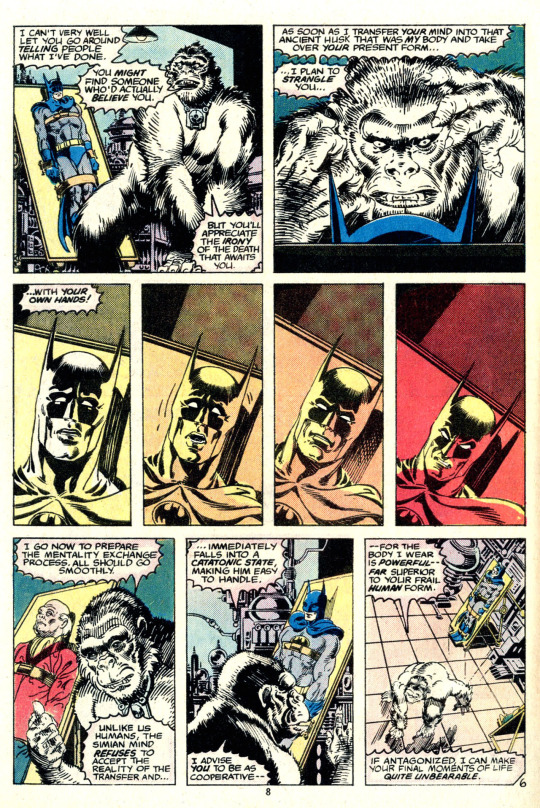
This is a silly premise that Starlin has transformed into a surprisingly creepy horror story by approaching it completely seriously, with effective pacing and evocative art aided by Tatjana Wood's excellent colors — the shifting color overlays to emphasize Batman's reactions are a great touch, and Russell breaks out the Zipatone for some interesting texture fills. (In this era, the use of Zipatone always signaled to me an artist especially committed to achieving a particular look; my understanding is that the publishers didn't pay for it, so it was a matter of the artist taking on the extra expense and effort out of creative rather than commercial ambition.) The ensuing fight is genuinely tense, emphasizing that Batman is physically overmatched. There aren't many Batman stories of this era that really suggest that Batman is in mortal jeopardy, but this is one of them.
I'm a little curious about the genesis of this story, which is quite a bit different in tone than the usual fare in BATMAN and DETECTIVE COMICS at the time. DETECTIVE COMICS had recently absorbed the defunct BATMAN FAMILY anthology, so some of the material included in DETECTIVE in this period (including solo strips for Robin, Batgirl, and Man-Bat) had obviously been commissioned for that title. THE BATMAN FAMILY hadn't originally included a Batman feature, but one was added when the book became an anthology with issue #17, presumably in an effort to spark interest in a title that was bleeding sales. The Batman stories in THE BATMAN FAMILY #18–20 had featured some very attractive artwork by Michael Golden, the standout being "The Tomb of the White Bat!" in #19, a Denny O'Neil script with art credited to Golden and Russell:
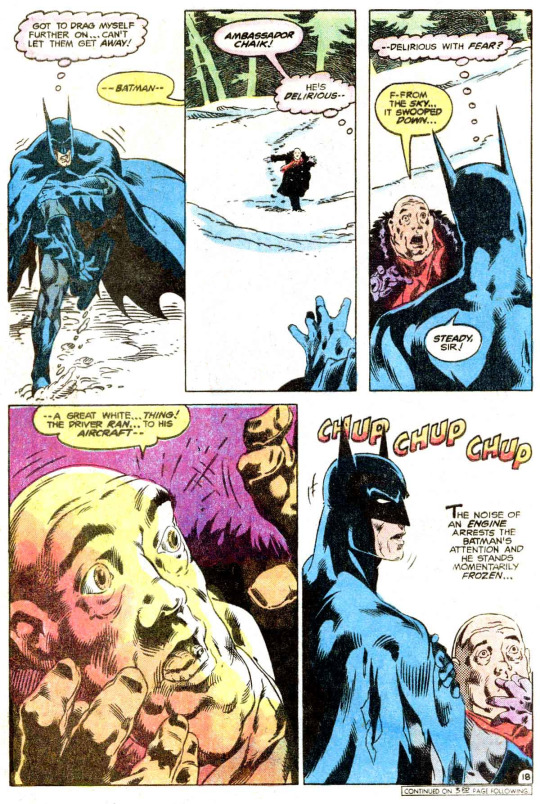
My tentative guess is that this Starlin/Russell story was intended to run in THE BATMAN FAMILY #21–22, and ended up in DETECTIVE #481–482 instead. That may be why DETECTIVE COMICS #481 had two Batman features: the first part of the Xavier Simon story ("Murder in the Night") and also a Denny O'Neil story with stylish art by Marshall Rogers.
#comics#detective comics#batman family#jim starlin#p craig russell#batman#denny o'neil#michael golden#the assertion that thomas wayne fought in WWI is odd#i'm not sure it works chronologically for either earth-1 or earth-2#but it's a minor point#i wish that the tomb of the white bat were better than it is#it looks pretty good and i see what it's going for#but o'neil clutters it up with obnoxious bits of business#that kind of take the mickey out of it#the starlin story is vastly more cohesive#it too suffers a couple of o'neil-like awkward asides#but they're less damaging because the direction is clearer
14 notes
·
View notes
Text
Looks at what happened in the fast pass. The way I yelled that character's name.
#I'm not sure if I should tag spoilers or not bc it's so vague like ''yes there are characters and yes I'm yelling about them''#spoilers#sbg spoilers#school bus Graveyard spoilers#tagging jic#dw I haven't forgotten abt the inbox tho. i just need to be able to form more than One cohesive sentence rn and unfortunately w how much#cleaning I'm doing rn I Am Incapable Of Doing That For Long#and I don't want to string together the most incomprehensible sentences ever Yknow
19 notes
·
View notes
Text
There are a couple tropes I really love in the space of Miraculous Ladybug fan works, but quite possibly my favorite is when the miraculous holders just get creature from using their powers.
Like yeah, I would say that hosting the power of an abstract concept given sentience, that got shoved into the shape of an animal and bound to a piece of jewelry, would kinda mess with your body a bit.
The little bit of this we get in canon is basically that Adrien loves being a cat and the whole Tikki munches incident.
But I love it when people give them ears and wings and tails, give them eyes that aren't quite human anymore. Fuck with their gender and their sense of body. Sometimes it's body horror, sometimes it's just aesthetic. Love it either way.
I just think it's so fun, a lot of the time it's combined with the like "when a holder and the kawami really respect and bond with each other there's nothing that can be done except having magic bleed into the holder" I think that's fun, but also just making the animal of the kwami a bigger deal is fun. Like if you're going to make it a ladybug you might as well give her wings and antenna and mirrored eyes.
#yes I do like ml#there's just so many characters I like to mess with in my head#also sue me I'm trans and have a certain respect for body horror. for the forced change of your physical self especially when you chose it#anyway I alwasys ramble in the tags#I set up this side blog to hide random writing thoughts I had and oh boy do I have a lot and none of them are on here#and recenetly (and by recently I mean like the past year) I've been hit with so many ml thoughts)#they're all gay#and some of them are cohesive#actually a lot of them revolve around chloe and au's where she gets a meaningful improvement arc#give that gay girl intresting stuff#miraculous ladybug#ml#although one of my ideas is also my very fun very gender take of ml where to conceal their identities ladybug and chat start pretending#to be different people under the masks like they don't need to like explicitly say. they just#switch costumes a lot and they like slyly hint at maybe theres dozens of people who pass around the miraculous to make sure that their#Identities are always safe#and to support the act they also start changing the genders they present as as holders. everyone is like “it's clearly multiple people”#and during this process marinette and Adrien are both like slowly having personal gender revelations#and gabe is like tearing his hair out over having to fight this secret group of superheros that he can never find or catch#but he's still just getting his ass kicked by two kids who're doing the world's most successful costumes change bits#it's like those “fake dating” tropes where they're like “oh but we really do love each other” but with gender#“oh I've got a great idea lets pretend to be different genders sometimes”#cut to “hmh ok so I think I'm not pretending anymore”#oh I do always ramble in the tags
6 notes
·
View notes
Text
rewatched The Blackwell Legacy last night bc I didn't feel like playing it for the fifth time and it really is strange coming back to it now that i'm ten years older and have real gamedev experience.
The game starts with three exposition dumps back-to-back that have nothing to do with your actual problem (arguing with a doorman). Abe Goldfarb doesn't have a pop filter on his mic. The music is too loud by default. There's moments where you can tell something intense is supposed to be going on, but due to the game's budget all the team has to work with are the voice performances and two sprites standing in a well-lit room.
...And somehow it all still kinda works? At least, none of those things were dealbreakers for me as a player. Technical issues like that aren't something I really thought or cared about. And now I have to 'cause it's basically my job, and...
I dunno. It's just nice going back to the origins of an indie studio, and knowing even if you make basic mistakes there's still gonna be people out there who enjoy your story and want to see four more games of it.
#blackwell blogging#altum videtur#(i'm sure i've talked about it before but each game gets progressively more cohesive with its puzzle/story design and its great)#(legacy also has two different commentary tracks for after the initial release and then after the steam release seven years later)#(and it's something that's been a huge help in my own projects)#(anyway i gotta stop being sappy on main i got shit to do today)
8 notes
·
View notes
Text
i am uh Not Impressed with the met gala looks this year
#personal#listen i'm not a fashion person at all but like#if it's 'garden of time' or whatever surely there was a way to combine the garden theme and fashions from past times#florals and older silhouettes and whatnot#in general none of it seems cohesive or on theme
3 notes
·
View notes